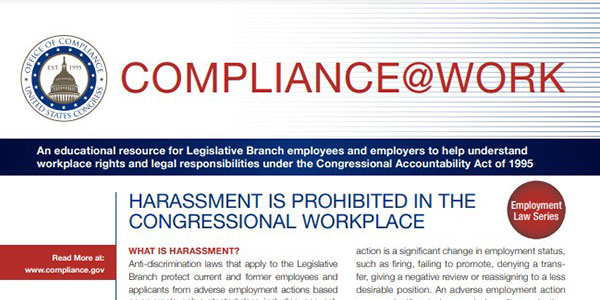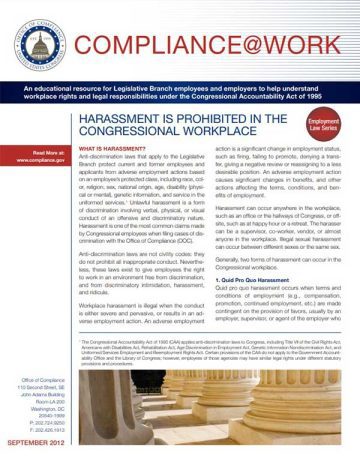WHAT IS HARASSMENT?
Anti-discrimination laws that apply to the Legislative Branch protect current and former employees and applicants from adverse employment actions based on an employee’s protected class, including race, color, religion, sex, national origin, age, disability (physical or mental), genetic information, and service in the uniformed services.1 Unlawful harassment is a form of discrimination involving verbal, physical, or visual conduct of an offensive and discriminatory nature. Harassment is one of the most common claims made by Congressional employees when filing cases of discrimination with the Office of Compliance (OOC).
Anti-discrimination laws are not civility codes: they do not prohibit all inappropriate conduct. Nevertheless, these laws exist to give employees the right to work in an environment free from discrimination, and from discriminatory intimidation, harassment, and ridicule.
Workplace harassment is illegal when the conduct is either severe and pervasive, or results in an adverse employment action. An adverse employment action is a significant change in employment status, such as firing, failing to promote, denying a transfer, giving a negative review or reassigning to a less desirable position. An adverse employment action causes significant changes in benefits, and other actions affecting the terms, conditions, and benefits of employment.
Harassment can occur anywhere in the workplace, such as an office or the hallways of Congress, or offsite, such as at happy hour or a retreat. The harasser can be a supervisor, co-worker, vendor, or almost anyone in the workplace. Illegal sexual harassment can occur between different sexes or the same sex.
Generally, two forms of harassment can occur in the Congressional workplace.
1. Quid Pro Quo Harassment
Quid pro quo harassment occurs when terms and conditions of employment (e.g., compensation, promotion, continued employment, etc.) are made contingent on the provision of favors, usually by an employer, supervisor, or agent of the employer who has the authority to make decisions about employment actions. Quid pro quo harassment can also occur when the rejection of such favors results in a tangible employment detriment, such as a loss of a job or job benefit. Commonly, quid pro quo harassment involves an adverse employment action that occurs after sexual advances are rejected by an employee or sexual favors are required for an employment benefit, such as a pay raise or job assignment.

